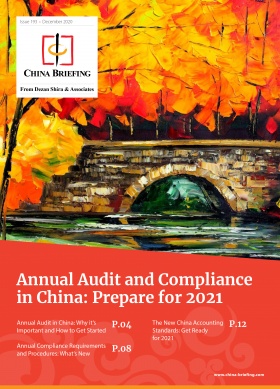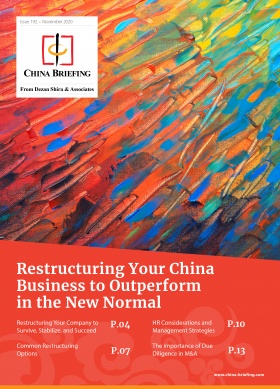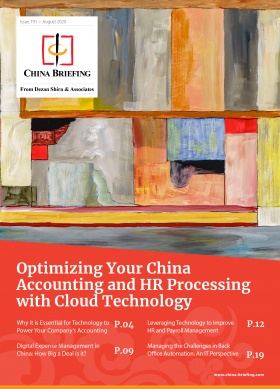China Releases Anti-Monopoly Guidelines for its Platform Economy
Since launching its high-tech revolution under the Made in China 2025 Masterplan, Internet Plus, and China Standards 2035 policy initiatives, China’s economy has rapidly changed and the country is becoming a production hub for high-tech products.
Many of these changes come under what is commonly referred to as the fourth industry revolution, where the application of internet and software facilitates every aspect of work and daily life. Here digital platforms play a key role and have resulted in the evolution of a platform economy – a digitally based economy where activities are facilitated by online platforms, backed by the fast-expanding Internet sector.
Indeed, the platform economy, especially in the realm of e-commerce and digital payments industries, is experiencing an explosive expansion; Alibaba, Tencent, and Ant Financial rank as the top three of the super-large platform enterprises in China.
However, the rapid growth and the economic power gained by these internet giants have generated concerns over the negative effects that they might have on the market – such as monopolies and unfair competition, infringement, and other issues. To address such issues, the Chinese government is starting to regulate the digital market, by increasing scrutiny and penalties and keeping in mind the peculiarities of the evolving and expanding platform enterprises.
In this context, on November 10, 2020, China’s State Administration for Market Regulation (“SAMR”) issued the draft of the Guidelines for Anti-monopoly in the Platform Economy (“Guidelines”) in order to prevent and stop monopolistic behavior in the platform economy, guide operators to operate in compliance with laws and regulations, and promote the sustainable and healthy development of the online economy.
SAMR had sought reviews and feedback from the public to the draft until November 30.
How do the guidelines seek to discipline the online market?
The Guidelines expressly refer to the Anti-Monopoly Law (“AML”), currently under revision, and set principles and rules to discipline the online market, in compliance with the provisions already stated under the AML.
Monopoly agreements
The Guidelines prohibit ‘monopoly agreements’ and define them as those agreements, decisions (either written or oral), or other concerted actions taken by platform operators and operators to exclude or restrict competition.
Horizontal and vertical monopoly agreements
According to the Guidelines, horizontal monopoly agreements are reached by fixing prices, segmenting the market, restricting production (sales), restricting new technologies (products), and boycotting transactions through the following methods:
- Use the platform to collect or exchange sensitive information, such as prices and sales;
- Use technical means to communicate;
- Using data and algorithms to achieve coordinated behavior; and
- Other ways to help achieve synergy.
A vertical monopoly agreement on the other hand, is reached by fixing resale prices and minimum resale prices through the following methods:
- Using technical means to automatically set prices;
- Using platform rules to unify prices;
- Use data and algorithms to, directly or indirectly, limit prices; and
- Use technical means, platform rules, data, and algorithms to limit trading activities, exclude or restrict market competition.
In evaluating whether or not an anti-monopoly agreement has been concluded, the anti-monopoly law enforcement agencies will generally consider factors, such as the market power of platform operators, relevant market competition conditions, the degree of hindrance to other operators from entering the relevant market, and whether the agreement has the effect of eliminating or restricting competition.
The introduction of a ban on monopoly agreements in the platform economy is particularly remarkable. Indeed, in the past, some technology giants adopted monopolistic behaviors in the Chinese digital market by manipulating platforms, data, algorithms, or other technical means (such as fixing resale or minimum resale prices, or imposing differentiated prices and conditions to different customers), thus negatively impacting competition on the digital market. The ban shall therefore curtail such behaviors and ensure fair competition in the platform economy.
Hub and spoke agreements
According to the Guidelines, hub and spoke agreements are forbidden.
Generally speaking, hub-and-spoke agreements can be defined as horizontal restrictions on the supplier or retailer level (the “spokes”), which are implemented through vertically related players that serve as a common “hub” (for instance, a common manufacturer or service provider). In other words, the hub coordinates the spokes thus controlling the competition among them.
With reference to the economy platform, platforms operators can reach hub and spoke agreements by using technological means, platform rules, data, and algorithms, with the effect of excluding or restricting competition among the operators on the digital market.
The express prohibition of this type of agreements is particularly remarkable in the context of platform economy. Indeed, for platforms operators is particularly easy to reach hub and spoke agreements, therefore an explicit ban is essential to establish good practices and guarantee fair competition on the digital market.
Leniency system
According to the Guidelines, business operators shall actively report about any horizontal monopoly agreement by providing relevant evidence, stop any violation, and cooperate with the deputed authorities during investigations. In such cases, the anti-monopoly law enforcement agency can mitigate or waive penalties for business operators.
Abuse of dominant market position
Dominant market position
The AML prohibits operators with dominant market positions from engaging in acts of abuse of dominant market positions. The AML defines dominant market position as “a market position held by operators that are capable of controlling the prices, quantities of commodities, other transaction terms in a relevant market, or preventing or exerting an influence on the access of other operators to the market”.
According to the Guidelines, the abuse of a dominant market position by operators is prohibited, and the relevant provisions of the Anti-Monopoly Law shall apply.
More specifically, with reference to the platform economy, the Guidelines list the factors to be considered to establish if an operator has a dominant market position:
- Operator’s market share and competition condition on the relevant market;
- The operator’s ability to control the market;
- The financial resources and technical conditions of the operator;
- The degree of dependence of other business operators;
- The degree of difficulty for other operators to enter the relevant market; and
- Other factors that determine the operator’s dominant market position based on the economic characteristics of the platform
The digital market has its own peculiarities and the Guidelines clearly reflect the aim of establishing a set of tailor-made rules to prevent and contrast abuses of dominant market position. Indeed, the above-mentioned criteria used to identify when a platform operator is deemed to have such a dominant position, are strictly linked to the digital market, where it is necessary to consider not only market shares, but also all the other variables.
Abuse of a dominant market position in the platform economy
According to the Guidelines, operators in the field of platform economy with a dominant market position may abuse their dominant market position in several ways, namely by:
- Selling goods at unfairly high prices or buying goods at unfairly low prices;
- Selling goods at prices below cost without justifiable reasons to eliminate or restrict market competition;
- Refusing to conduct transactions with counterparties without justifiable reasons to exclude or restrict market competition;
- Restricting transactions to counterparties without justifiable reasons, and exclude or restrict market competition;
- Implementing tie-in sales without justifiable reasons or set unreasonable trading conditions to eliminate or restrict market competition; and
- Imposing differential treatment on counterparties with the same trading conditions without justifiable reasons, to exclude or restrict market competition.
The behaviors listed under the Guidelines as abuse of a market dominance, include some of the most common practices implemented by some of the major e-commerce platforms (for instance, requiring sellers to remove the online shops from other competing platforms). The new legal framework is expected to have a direct impact on internet giants’ behaviors, who will face penalties in case of violations.
Concentration of undertakings
Monopolistic behaviors
The AML prohibits operators from securing a concentration of undertakings that have or may have the effect of eliminating or restricting competition, defining them as monopolistic behaviors, consisting of:
- Merger of undertakings;
- Control over other undertakings gained by acquiring their shares or assets; and
- Obtaining control or a decisive influence over another undertaking by signing contracts or via other means.
Pursuant to the Guidelines, the anti-monopoly enforcement agency shall review the concentration of operators in the field of platform economy, investigate and deal with the illegal implementation of the concentration of operators.
Antitrust review
AML provides for a notification mechanism according to which business operators shall declare to the anti-monopoly law enforcement agency in advance about a concentration that reaches certain thresholds prescribed by the State Council.
If the concentration of undertakings leads, or may lead, to elimination or restriction of competition, the anti-monopoly law enforcement agency shall prohibit the concentration. However, if the undertakings concerned can prove that the advantages of such concentration outweigh the disadvantages, or that the concentration is in the public interest, the anti-monopoly law enforcement agency may decide not to prohibit their concentration.
Pursuant to the Guidelines, for the concentration of business operators that is not prohibited, the anti-monopoly law enforcement agency may decide to apply the following types of restrictive conditions for lessening the negative impact exerted by such concentration on competition:
- Structural conditions, such as the divestiture of tangible assets and the divestiture of intangible assets, such as intellectual property, technology, data, or related rights and interests;
- Behavioral conditions, such as opening up infrastructure like networks or platforms, licensing key technologies, terminating exclusive agreements, and modifying platform rules or algorithms; and
- Comprehensive conditions combining structural conditions and behavioral conditions.
Interestingly, the Guidelines expressly state that concentration involving variable interest entity (VIE) will be also subject to filing requirements, and therefore will also fall within the scope of the antitrust review.
The reason behind this scrutiny is that VIE structures (also referred to as “agreement-based control”) can be used in China by foreign investors to gain control over a Chinese company and operate in sectors, like the internet economy, subject to restrictions under Chinese law, thus circumventing its regulations.
Hence, this provision of the Guidelines is a remarkable change in the anti-monopoly legal framework, because even though SAMR started to accept application of concentrations involving VIE structures in practice earlier this year, this is the first time that the antitrust review is officially imposed on such transactions.
Abuse of administrative power to eliminate and restrict competition
According to both, the Guidelines and the AML, administrative departments and other organizations authorized by laws or regulations to perform the function of administering public affairs shall not abuse their administrative power to eliminate or restrict competition – for instance, by setting discriminatory standards and implementing discriminatory policies, or by forcing operators in the field of platform economy to engage in monopolistic behaviors.
In the event of suspected abuse, the anti-monopoly authorities will conduct investigations according to the AML and other applicable laws and regulations. During an investigation, the investigated persons shall cooperate with anti-monopoly authorities and shall not refuse or hinder the investigation.
The Guidelines and the reform of the Anti-Monopoly Law
On January 2, 2020, SAMR publicly released the Anti-Monopoly Law Revised Draft for Public Comments (“AML Draft”), revising for the first time the AML that went into effect in 2008. The AML Draft is now subject to consultation and there is no fixed timetable for its adoption.
The AML Draft significantly increased the legal liability of offenders by introducing higher penalties and criminal liabilities for monopolistic behaviors, but also introduced many new systems, such as investigating the legal responsibilities of operators who help other operators to reach monopoly agreements and assessing the abuse of dominance in the internet sector based on a list of suggested factors – network effects, economies of scale, lock-in effects, and its ability to acquire and process the relevant data.
Hence, the AML Draft appears coherent with the principles set under the Guidelines and, when it will become effective, the antitrust legal framework will strengthen the protection and promotion of healthy competition within all sectors of the Chinese economy, including the platform economy.
Meanwhile, the Guidelines together with the current version of the AML, already provide a set of rules to increase scrutiny on internet platforms and prevent online operators from dominating the market. Indeed, for example, the Guidelines consider whether a transaction treats customers in different ways – based on big data, payment ability, consumption preferences, and usage habits and also prohibit practices, such as “choose one between two”, through which an operator restricts others from selling on different platforms.
Notably, the Guidelines’ provisions have already produced effects on the market – interestingly, Ant Group suspended its planned US$37 billion share market listing not long after regulators warned the company that its lucrative online lending business faced tighter government scrutiny. The impending regulations will likely have an impact on the biggest companies operating online, such as Alibaba Group’s Taobao, Tmall, and JD.com as well as payment services like Ant Group’s Alipay and Tencent Holding’s WeChat Pay.
About Us
China Briefing is written and produced by Dezan Shira & Associates. The practice assists foreign investors into China and has done so since 1992 through offices in Beijing, Tianjin, Dalian, Qingdao, Shanghai, Hangzhou, Ningbo, Suzhou, Guangzhou, Dongguan, Zhongshan, Shenzhen, and Hong Kong. Please contact the firm for assistance in China at china@dezshira.com.
We also maintain offices assisting foreign investors in Vietnam, Indonesia, Singapore, The Philippines, Malaysia, Thailand, United States, and Italy, in addition to our practices in India and Russia and our trade research facilities along the Belt & Road Initiative.
- Previous Article China SME 2021 Business Compliance as Uncertainty is the New Normal
- Next Article Beijing Promotes the Application of Electronic Seals







